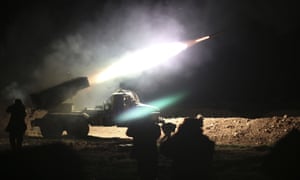
Signs of wider military cooperation in Syria have emerged as Russia revealed that discussions have taken place about coordinating the liberation of the Islamic State stronghold of Raqqa in conjunction with the US.
Russia and the US have slowly been working more closely in the wake of the partial Russian withdrawal of its aircraft from Syria, including an agreement last week to press President Bashar al-Assad to hold talks with the opposition about a political transition once peace talks recommence after 9 April in Geneva.
Russia and the US are discussing “concrete” military coordination to liberate the Isis stronghold of Raqqa, Interfax news agency cited the Russian deputy foreign minister, Oleg Syromolotov, as saying on Wednesday. The revelation follows visits to Moscow this month by the US secretary of state, John Kerry, and CIA head John Brennan.
In a separate development Assad told the Russian news agency RIA he could foresee agreement on a political settlement for Syria within weeks, a timetable that runs ahead of anything that has been discussed in Geneva. Giving his first response to the first round of Geneva peace talks, Assad told RIA that it was “logical for there to be independent forces, opposition forces and forces loyal to the government represented there”. But he seemed to hold out against the formation of a transitional governing body with full executive powers, even though this is proposed as part of the UN roadmap and is the key demand of the opposition. Assad said: “Neither the Syrian constitution, nor the constitution of any other country in the world, includes anything that is called a transitional body of power. It’s illogical and unconstitutional.”
“There are many questions that need to be discussed in Geneva, but there are not difficult questions,” Assad said. “I don’t consider them difficult, they can all be resolved.”
The Syrian opposition maintained that Assad must go as as part of any arrangement, though. “The government, whether it’s new or old, as long as it is in the presence of Bashar al-Assad, is not part of the political process,” said George Sabra, a negotiator for the High Negotiations Committee representing the opposition at the Geneva peace talks.
No comments:
Post a Comment